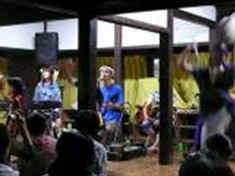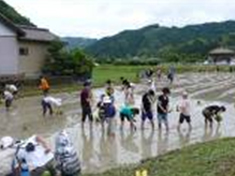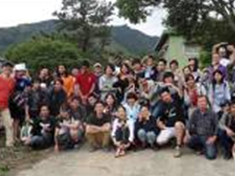Report
Power of arts: Field trip to a Fujieda organic farm, Shizuoka (18-19 June 2011)
Download reports by FOLENS students>>![]() Chihiro Yamaguchi,
Chihiro Yamaguchi,![]() Nobuaki HANATA,
Nobuaki HANATA,![]() Kazuhiro Aoi,
Kazuhiro Aoi,
![]() Kazuya Aoki,
Kazuya Aoki,![]() Kojiro Shimada,
Kojiro Shimada,![]() Yeo Bee Geok(Maybelline),
Yeo Bee Geok(Maybelline),![]() Kamimura Miu,
Kamimura Miu,![]() PYONE WinWin,
PYONE WinWin,
![]() Rola Mahmoud,
Rola Mahmoud,![]() Ryo Higuchi,
Ryo Higuchi,![]() Roeurn Siranet,
Roeurn Siranet,![]() SOOYOUN NAM,
SOOYOUN NAM,![]() Yuya Miyazaki,
Yuya Miyazaki,![]() XIAO ZHIQIU,
XIAO ZHIQIU,
![]() Aung Zaw Oo,
Aung Zaw Oo,
![]() Antonio Manuel dos Santos Junior,
Antonio Manuel dos Santos Junior,
=============================================================
 |
 |
 |
||
It was rainy again – the first day of this second year field trip to the Fujieda organic farm was a typical day of ‘Baiu (the rainy season)’ in Japan. Sixteen FOLENS students participated in the two-day field study organized by Department of International Environmental and Agricultural Science (IEAS) of TUAT. With kind permission by IEAS, FOLENS became a co-organizer and placed this field trip as one of FOLENS Seminar. Not only students from TUAT but also, same as last year, a number of people who were interested in the organic tea farming participated in this field study. The Kinezuka Family, the Fujieda organic farm owner, welcomed all the participants in the typical landform scenery of a Japanese mountain village.
Plenty of activities in various aspects were involved. Right after the arrival, the participants visited a tea farm on the top of the hill and Mr. Kinezuka explained his practice of organic, pesticide-free tea farming. Given the Fukushima Daiichi nuclear power plant accident and subsequent fallout of radionuclides, much of the talk by Mr. Kinezuka was about situation of accumulation level of radioactive cesium in tea leaves and their response to it. A negative impact of the nuclear plant accident has certainly spread even over the Chubu Area, 400 km away from the Fukushima Daiichi. After coming back to the lodge, a lecture by a restaurant owner in Tokyo, Mr. Masaru Kosaka, who wrote a book titled ‘Living downshifted’ was provided. He argued feasibility of growth-based economy in the present world and proposed so-called ‘slow life’. His discussion involved various unique aspects in questioning the current prevailing lifestyles in cities under strong influence of the growth-based economy and suggested alternatives (I expect some reports by students would discuss on his alternatives). Then, after the lecture, a music band from Osaka presented their wonderful music and dance performance. The band had strong messages on the environment, including the suffering people in Fukushima, and conveyed the messages quite effectively through the performance. After the show, the dinner barbeque using organic ingredients began and some students dealt with and prepared chickens for it. A night tour for finding fireflies was not forgotten. In the morning of the second day, it was not raining during the time of observing paddy irrigation system and transplanting rice seedling in the paddy field. Finally, wrap-up group discussions were conducted among the participants on diverse issues related to the two-day experience.
The Fujieda field ‘school’ is always full of surprise and discovery. Flexibility is required to participate in the school. The music performance was a typical example of the surprise and discovery; it clearly demonstrated the power of arts in networking for the environmental activities. If you feel your brain is a bit stiff in these days, come to Fujieda. (28 June 2011; TF)
Note. Reports of the Fujieda school in the previous year are available at:
http://www.tuat.ac.jp/~folens/report/report4_e.html
http://www.tuat.ac.jp/~folens/report/report12_e.html